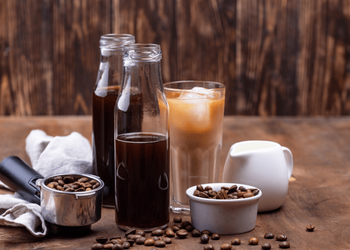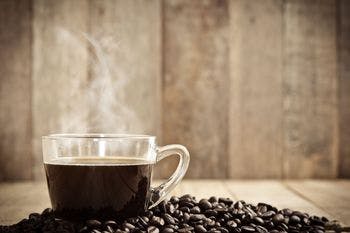
Cold Brewed vs Hot Brewed Coffee (7+ Major Differences)

Do you find it challenging to choose between hot-brew and cold-brew coffee? Then I have got your back.
The world of coffee is vast, and the methods of brewing are diverse.
Today, in this article, I will share with you the detailed difference between hot brewed coffee and cold brew..
If you're a seasoned coffee enthusiast or a curious beginner, I'll guide you through the differences, and points to consider for these drinks and help you decide which drink aligns best with your preferences.
So let's start the showdown.
Cold Brewed Coffee: Overview
What is cold-brewed coffee?
Cold brew is one type of cold coffee prepared by steeping or soaking coffee grounds in cold water for an extended period of around 12-24 hours.
How cold brew is made?
Brewing a cold brew is pretty simple.
Step 1: Begin by grinding
Take whole beans and grind it to a medium-coarse ground.
Step 2: Measure the coffee
Generally for cold brews a 1:4 coffee-to-water ratio is preferred. Thus I will be using 1 cup of coffee and 4 cups of water.
Step 3: Let the coffee steep
For steeping, take a pitcher or mug and add water and coffee to it. Now stir it well and saturate the grounds. Once done, cover it with a lid and keep it aside for steeping. Let it steep for around 12-24 hours.
You can do one thing: you can let it steep overnight for a cold brew in the morning.
Step 4: Filter your coffee
Now finally put a filter and strain the coffee through your filter. After filtering, discard the grounds and filter. Your cold brew is ready.
You can dilute it with water for a light brew. Add flavored syrups, chocolate, or ice if you like it that way.
Many coffee lovers like to top it with some vanilla for a sweet flavor profile.
Advantages
1) Smooth and less acidic
Cold brewing extracts coffee grounds differently, resulting in a smoother, less acidic cup. If more acidity discomforts you or simply enjoy a milder flavor, cold brew is a perfect choice.
2) Perfectly refreshing
Cold brew is ideal if you are looking for a refreshment cup on your warm days. Add it over ice, and you've got a cool drink that can keep you energized throughout the day.
3) Customizable flavor profile
Tailor your cold brew to suit your taste buds. Experiment with different dilution levels, try milk or other alternative options. You can add flavored syrups for a personalized coffee experience.
4) Longer shelf life
The best part about cold brew is its concentrated nature which helps to maintain its quality for a longer period. Refrigerate it, and you'll have a ready-to-go coffee option whenever you have a cold brew craving.
5) Less bitterness
Cold brewing reduces the bitterness with the water dilution. Thus if you prefer a lighter brew, cold brew might be the answer.
6) Caffeine kick
Cold brew is marked for its higher caffeine content which makes it an excellent choice for coffee enthusiasts seeking an extra energy boost without compromising the flavor.
7) Versatile brewing
The concentrate you achieve from cold brewing is versatile. You can simply use it as a base for various coffee drinks, like iced lattes, coffee cocktails, or even coffee desserts.
Disadvantages
1) Time-consuming brewing process
Though it is very easy to brew already refrigerated cold brew. It is time-consuming when you are making it from scratch. It takes a longer steeping time, around 12-24 hours. So if you're looking for a quick caffeine fix, then this can be a constraint for you.
2) Requires additional containers for storage
To store a cold brew well you need specific airtight containers. Thus investing in such tools might not be ideal for everyone as it can impose additional costs.
3) Higher caffeine content
While it is a bonus point for caffeine lovers who love concentrated coffee, it can be a drawback for those who like to keep it milder.
4) Potential for over-extraction
Due to the longer steeping process, there's a risk of over-extraction, which results in a brew that's too strong or bitter. Precision is vital to avoid this challenge.
5) Has sediments
Cold brew has certain sediments. While it doesn't affect the taste, those who prefer a visually clear cup might find it less appealing.
6) Cost factor
Ready-made cold brew options or cold brew concentrates available in stores are relatively expensive compared to traditional brewing methods.
7) Not ideal for all coffee beans
The cold brew method might not complement all coffee bean varieties. Some beans are best suited for hot brewing methods, and using them for cold brew might not yield the desired flavors.
Read More:
- Learn to make cold brew in a mason jar
- Learn to make cold brew in French press
Hot Brewed Coffee: Overview
What is hot brewed coffee?
Hot brewed coffee is the brewing method where hot water is poured over the coffee grounds to extract the rich flavors and aromas. The hot water extracts the intricate compounds and oils from the coffee which results in a robust and aromatic cup of coffee.
How hot brew coffee is made?
The hot brew is most preferred by coffee lovers and savored as morning caffeine intake.
Step 1: Begin by grinding
Take whole beans and grind it to a medium-coarse ground.
Step 2: Measure the coffee
Generally for hot brews a 1:2 coffee-to-water ratio is preferred. Thus I will be using 1-2 tablespoons of coffee and 2 cups of water. You can even use 4 tablespoons if you like it concentrated.
Step 3: Boil the water
Take 2 cups of water and boil it for a while. 2 minutes on medium flame is enough.
Step 4: Add water to the brewer
Take a brewer of your choice and rinse it with some warm water. This will prepare your brewer for brewing.
Step 5: Add coffee to the brewer
Add coffee into your preferred brewing device and pour hot water from above in circular motions. Here I am using a French press. Let it bloom for 4 minutes and then plunge it down.
Your hot brew coffee is ready. Sip it with some croissants.
Advantages
1) Quick brewing
Generally hot brew is comparatively quick. With the advantage of methods like drip brewing and espresso, you can have a cup of hot coffee ready in no time.
2) Versatility
Hot brewing allows different brewing methods, from traditional drip coffee makers to pour-over setups and espresso machines. This versatility serves people with various taste preferences and brewing styles.
3) Full-flavor extraction
The heat in hot brewing aids in extracting more flavors and aromatic compounds from coffee grounds which results in a robust and well-balanced cup.
4) Immediate brewing
You can sip hot coffee immediately after brewing. Thus it satisfies immediately those who crave a warm and comforting beverage.
5) Enhanced aromas
The steam produced while hot brewing carries the amazing aroma of freshly brewed coffee and creates an immersive and aromatic experience.
6) Ideal for different blends
Hot brewing is favored for blends, as the heat helps to combine different coffee beans' flavors seamlessly.
Disadvantages
1) Temperature sensitivity
Hot-brewed coffee is sensitive to temperature which means it's best enjoyed immediately after brewing. If you keep it sitting for too long, it can lose its optimal temperature and taste.
2) Risk of bitterness
If not brewed correctly, hot coffee can become bitter. Factors such as grind size, brewing time, and water temperature must be considered to avoid an overly bitter taste.
3) Acidity levels
Some hot-brewed coffees, especially those brewed using beans from certain regions or with specific types, can be more acidic. For individuals who prefer a less acidic taste, this might be a drawback.
4) Equipment dependency
The perfect hot brew may require specific equipment like espresso machines, pour-over kits, or drip coffee makers, which makes it less accessible for those without such tools.
Cold Brew vs Hot Brew Coffee: Quick Comparison
1) Flavor profile
Cold brew is marked for its smooth, mellow, and less acidic taste. It helps to bring out different flavor notes, often highlighting chocolatey or fruity tones. While hot brew offers a more diverse flavor profile. The heat during brewing can extract a wide range of flavors, which results in a fine and layered taste experience.
2) Acidity level
Cold brew is generally less acidic, making it a preferable choice for individuals sensitive to acidic beverages. While hot brew can vary in acidity depending on factors like bean type, roast level, and brewing method. Some may find it more acidic than cold brew.
3) Caffeine content
Cold brew has less caffeine, but it's concentrated, so dilution is common. While hot brew comparatively has higher caffeine content due to the quicker extraction process.
4) Efficiency of extraction
Cold brew has lower extraction over an extended period allowing for a diverse concentration of flavors. While hot brew has higher extraction due to heat, which brings out a broader spectrum of compounds.
5) Popularity
Cold brew has gained popularity in recent years, it is preferred in warm seasons and coffee lovers seeking a smoother coffee experience enjoy it more. While hot brew is traditional and enjoyed in various cultures worldwide.
6) Time taken to brew
Cold brew requires a longer steeping time of 12-24 hours. While hot brew is fast at brewing and takes a few minutes.
7) Ease of preparation
Cold brew is simple but planning is necessary due to the longer steeping time. While hot brew is quick, straightforward, and suitable for those who prefer immediate satisfaction.
8) Brew temperature
Cold brew is brewed with cold water and eliminates heat from the process. While hot water involves higher temperatures during brewing.
Hot brew or cold brew: Which is suitable for you?
When to choose cold-brewed coffee?
If you crave a smooth, mellow, and less acidic coffee experience and don't mind a bit of planning, then cold brew coffee is the perfect choice for you. It caters to individuals who find traditional coffee too bitter or overpowering.
When to choose hot brewed coffee?
Opt for a hot brew if you savor a diverse flavor profile, need a quick cup, or cherish the classic warmth of traditional coffee. Hot brewing extracts flavors rapidly with its hot water infusion and offers a quicker brewing option for those on the go.
Conclusion
Here, I have got you covered with the differences between cold brewed and hot brewed coffee.
Cold brew, with its smooth and less acidic profile, is perfect for those who enjoy a milder flavor, refreshing iced drinks, and versatility in customization.
However, it's time-consuming, and specific storage requirements might not suit everyone.
On the other hand, hot brew provides a quick, robust, and aromatic cup, catering to those who appreciate immediate satisfaction and diverse blends.
The choice between cold and hot brews depends on individual preferences and offers special characteristics for different coffee enthusiasts.
That's all for this article, and I hope you now have a clear understanding to make the perfect brew that suits your taste. For more such coffee adventures follow us on Instagram or subscribe to our YouTube channel.
Which team are you TEAM COLD BREW or TEAM HOT BREW? Share in the comments section.
FAQs
1) Can you heat cold brew?
Yes, you can heat a cold brew by diluting it with hot water or steamed milk, but it alters the flavor profile.
2) Can you use regular ground coffee for cold brew?
Yes, you can use regular ground coffee for cold brew, but coarser grounds are preferred for optimal extraction.
3) Is hot brew coffee stronger than cold?
Cold brew is often more concentrated than hot brew which results in a stronger flavor when properly diluted.

I am a barista by profession hailing from NC. My journey began in my late teens when I started working as a barista in a local coffee shop. My passion for coffee quickly became evident as I immersed myself in the art of espresso extraction, latte art ...



